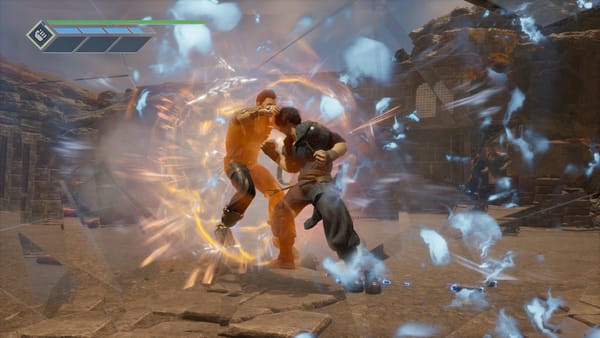#112: Critical thinking
No, videogame reviews aren't dead.
[Thanks for reading Hit Points! If this is your first time, then a hearty welcome to you. If you enjoy today’s edition, note that you can sign up for free to get this twice-weekly look at the latest goings on in the game industry sent straight to your inbox. It also gets you access to the full Hit Points archive. Thanks, and enjoy!]
Several years ago, at a New Year’s Eve party, I got cornered by someone I’d never met, but who had somehow found out what I did for a living. He was a real tractor beam, this one, inescapable once he’d found me, and so I had to listen for an hour or more to his repeated insistence that magazines were dead, the written word was pointless, that games websites were bought off by publishers, and there was no longer any need for reviews because you could look at a game on YouTube and make up your own mind. You know, one of those. I was polite for a while, of course, but grew progressively less so over time, as it became clearer and clearer just who I was dealing with. Eventually I snapped. “If YouTube tells you all you need to know,” I asked, “how come you haven’t got a fucking clue what you’re talking about?” I regret the outburst but look, I’d been drinking. Decent party, that aside.
I was reminded of that yesterday, in a roundabout way, by an opinion piece on GI.biz by Alex Nichiporchik, founder and CEO of the indie publisher TinyBuild, titled “Why review scores are dead”. While we shan’t blame him for the slightly sensationalist headline, which I doubt he wrote himself — and with the caveat before we get started that I’m not picking on him or TinyBuild, because I know that a lot of industry folks are thinking and talking about this stuff all the time — parts of this have rubbed me up the wrong way, and need addressing if I’ve any hope of getting to sleep tonight. We’ll try and be a bit more elegant about it than I was with that bloke at the party, mind you.
“Even outside of early access, there's a huge number of titles that have seen major overhauls or content updates that would change a review score, but there's almost no outlets that re-review games. That original score, however misrepresentative it is of the game that exists now, is what people see when they turn to Metacritic.”
His central thesis — that games change so much after launch these days that they render day-one Metacritic averages irrelevant — is a reasonable point. I can imagine that stings a bit when you work tirelessly, in the months and years after release, to make a bad game good, or a good one better, but its launch-day average review score is set in stone. My problem is that he appears to pin the blame for all this on reviews, reviewers and the outlets that employ them, when the root of most of what he’s complaining about lies rather closer to home.
Nichiporchik hangs the whole thing, understandably but quite unwisely, on Hello Neighbor, which TinyBuild published in 2017 to a dismal reception. Its PC Metascore is 38; on Xbox One, 42. (He says that “a major outlet gave it 4 out of 10”; in fact, many major outlets scored it even lower.) In the years since, as Nichiporchik points out, TinyBuild and developer Dynamic Pixels have worked hard on the game, fleshing out its content offering and fixing bugs. Today, Hello Neighbor’s overall user rating on Steam is Very Positive — yet its miserable Metascore endures.
Apparently this is the media’s fault for not keeping on top of the game’s progress and adjusting its original review score accordingly. Leaving aside the logistical implausibility of this — it is hard enough for outlets to keep up with the lightning pace of new releases these days, never mind also keeping tabs on five-year-old games that just got a new level or QoL overhaul — you cannot fairly pin this on the press. They reviewed the game TinyBuild shipped, and by Nichiporchik’s own admission it was not a good one.
“Hello Neighbor wasn't particularly well received by the press when it first released,” he writes, “and I can't deny that part of that was due to bugs and other technical issues.” Blaming the press for that is, I think, a bit like burning a lasagne and blaming the oven. Here’s my counterpoint: TinyBuild knew it was launching a game with “bugs and technical issues” and went ahead and did it anyway. There is one pretty obvious way to avoid all this, and I do not believe it involves axing review scores or setting fire to Metacritic.
Elsewhere, Nichiporchik takes issue with how unrepresentative the critic’s experience of a game is of the player’s, because the reviewer typically has to play through the game in a tightly condensed window of time. On this, Alex, you and I surely agree. But once again, whose fault is it really? Ask ten random game journalists if they would prefer review code to arrive earlier than it currently does and nine of them would bite your hand off. The only holdout will have missed the email because they were crunching through some review code that turned up three days before embargo.
In my consultancy work I frequently recommend that clients get review code into outlets’ hands as far ahead of launch as possible, and I do not merely say this because I spent ten years as a game journalist pining for an easier life and we all want to leave the world better than we found it. Few games are flattered by being raced through to hit a tight deadline. My advice in this respect is rarely heeded, and I understand why — games come in hot these days and there’s almost always a day-one patch to complicate things — but, again, to take this as evidence that It Is The Reviews That Are Wrong seems to me to be coming at things from the wrong direction.
I’ve written before about how reviews are, if anything, more important than ever, and I shan’t repeat myself now. (You can read it here, if you fancy. That was a good one.) I think Nichiporchik is right that outlets could do more to make clear that launch reviews of living games may be out of date — perhaps in the same way that news outlets badge old stories to make clear they are not representative of current events — but I also think that player communities are intelligent enough to work this stuff out for themselves, and seek out a range of opinions if they’re interested in buying a game years after release.
And besides, I’d argue that having a game’s launch-day review score etched in stone for the rest of time is a good thing. For players it’s a warning, or an advertisement, that a creator has a particular track record at launch. It’s an incentive to developers and publishers to firstly fix up a poorly received game — I imagine Hello Neighbor’s poor launch scores may have given TinyBuild and Dynamic Pixels a little extra motivation as they set about the repair job — and then to be a bit more conscious when their next game approaches release of what happens when a game launches underbaked. They’ll be stuck with those scores forever, after all, because in this business there are no do-overs. Sure, the runways are pretty long these days, but it still helps if you stick the landing.
MORE!
- Epic Games has raised $2bn in funding, split evenly between Sony and Lego holding company KIRKBI, for typically vague metaverse things. “This investment will accelerate our work to build the metaverse and create spaces where players can have fun with friends, #brands can build creative and immersive experiences, and creators can build a community and thrive,” parped Epic CEO Tim Sweeney. Bit confused as to why Epic needs to raise funds for this — it surely has plenty of its own already, no? — but ho hum.
- Nintendo has bought a plot of land adjacent to its Kyoto HQ, on which it plans to build the romantically named Corporate Headquarters Development Centre Building No 2. Just rolls off the tongue, doesn’t it. The firm, which has spent ¥5 billion ($40m) on the land, hopes to have the new building up and running by 2027, just in time for Eiji Aonuma to delay Breath Of The Wild 2 for the ninth time.
- Activision Blizzard has hired Kristen Hines from Accenture as its new head of diversity, equity and inclusion. Heck of a job, that.
- Kingdom Hearts 4 is a thing, with Square Enix moving the series over to Unreal Engine 5. Over to you, Alan.
There you go. A hearty welcome to the 100-odd new readers brought here from (I assume) Eurogamer; you now have access to the full Hit Points archive, so fill your boots.
Oh, and apologies if you received Friday’s edition twice — a Substack-wide error, supposedly, which has since been fixed.
As ever, if you’ve enjoyed this, please do give it a share; I shall save the hard sell for Friday but it really does help a lot. Have an excellent week, and I’ll see you in a few.





